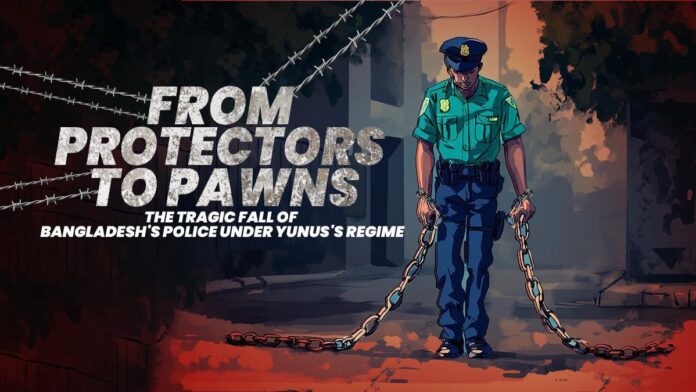The darkest chapter in Bangladesh’s history began on July 20, 2024, when Mohammad Yunus — a foreign passport holder, notorious NGO tycoon, and willing pawn of hostile foreign interests — launched an unlawful civil-military coup with the backing of Islamist militants and extremist networks. This brazen seizure of state power marked the beginning of a calculated campaign to shatter the backbone of the nation: the Bangladesh Police.
Once a proud symbol of law, order, and sovereignty, the police force quickly became one of the first targets of Yunus’s conspiracy. Through a ruthless combination of purges, demoralization, and political manipulation, Yunus and his cadre of opportunists dismantled an institution that had long stood as a guardian of the people. The systematic destruction of the police was not a side effect of his rule — it was a central pillar of it.
When Islamist mobs flooded the streets during the July riots, attacking police stations, lynching officers, and looting arms, Yunus and his allies celebrated. The violence was not an accident; it was a carefully orchestrated rehearsal for the total subjugation of the state’s security apparatus. Blood ran in the streets, and Yunus’s faction waded through it straight into power.
Those officers who had dared to resist the coup were swiftly punished. Transfers, demotions, dismissals — anyone who remained loyal to the republic was methodically removed. In their place, the regime promoted loyalists: corrupt, incompetent, and utterly servile figures whose only qualification was their willingness to act as personal enforcers of an illegal government.
From August 5, 2024, the second, more brutal phase began. Senior, capable, and patriotic officers were systematically sidelined, while party sycophants and opportunistic mediocrities were handed promotions without regard to merit, training, or competence. Overnight, the Bangladesh Police was transformed from a professional institution into a private militia, serving not the people but the narrow, despotic interests of Yunus and his cronies.
Religious minority officers faced an especially vicious form of persecution. Many were transferred to remote outposts, denied promotions, subjected to daily humiliation, and, in some tragic cases, driven to suicide. Each death was coldly dismissed as “natural causes,” and no serious investigations were ever conducted. The message was clear: loyalty to the regime — not to the law, not to the nation — was the only guarantee of survival.
Adding to this catastrophe, Yunus’s administration reinstated a host of disgraced, corrupt, and retired officers, bypassing all standard procedures. Simultaneously, recruitment drives filled the lower ranks with radicalized youth with known ties to extremist groups. Under the guise of police uniforms, they became a new threat to national security — untrained, unaccountable, and deeply loyal to an illegal regime.
Bangladesh’s police — once synonymous with bravery, professionalism, and sacrifice — was thus reduced to a pitiful shadow of its former self: a broken, demoralized, and heavily politicized force.
This was not mere incompetence; it was deliberate sabotage. Every thread of morale was shredded. Every voice of conscience was silenced — either through imprisonment, dismissal, or psychological destruction. Those officers who became casualties of this conspiracy will be remembered as the unsung heroes of a dark time. In contrast, Yunus and his government will forever bear the stain of betrayal.
Today, Bangladesh stands dangerously exposed. With its primary security force gutted, the sovereignty, stability, and very survival of the nation hang by a thread. Yunus’s regime has not just failed to govern — it has actively dismantled the organs of state power, leaving a trail of destruction that no amount of propaganda can erase.
The cry of anguish from within the ranks of the police today echoes across the nation. Tomorrow, it will swell into the roar that signals the fall of Yunus’s disastrous rule.
In history’s eyes, Yunus and his administration will not merely be judged as failures. They will be remembered as traitors — the architects of a calamity that gutted the soul of a nation.





